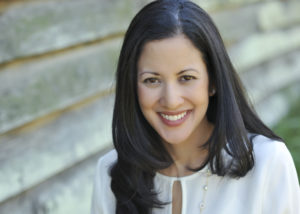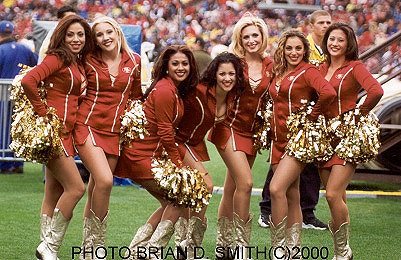 Zenobia is a former San Francisco 49ers cheerleader with an economics degree from Stanford University!
Zenobia is a former San Francisco 49ers cheerleader with an economics degree from Stanford University!
You have a degree in economics from Stanford with minors in industrial engineering and psychology. What got you interested in those subjects?
I have to say, in every case, it was the professors. They were so passionate about the subjects, that they drew you in and got you hooked. Economics is nicknamed ‘the dismal science’, but that’s really not true! My first semester at Stanford, I took Economics 101 from a professor named Michael Boskin. He also happened to be chair of the Council of Economic Advisors under George H. W. Bush and Chairman of a Congressional Advisory Commission on the Consumer Price Index. So clearly a guy who loves economics and really made the subject come to life. Knowing I wanted to go into business after school, both Industrial Engineering and Psychology felt like a great training ground. Psychology has the added benefit of just being downright fascinating and useful in every aspect of life.
Favorite and/or most challenging courses you took to prepare for your degree? Why?
The plus and the minus about having a major and two minors is that you take a lot of classes! Favorite class – Human Behavioral Biology (as part of my psychology minor), taught by Robert Sapolsky. It was an integration of many disciplines (neuroscience, psychology, endocrinology, etc.), used to examine normal and abnormal behaviors such as aggression, use of language, and mental illness. Two-hour lectures flew by in that class! Most challenging class – stochastic modeling (Industrial Engineering). But it has so many great applications, even to media and marketing, that I’m glad I took it.
You’re now Chief Executive Officer (CEO) of your own technology-focused public relations firm. How did that come about?
I worked in public relations for several years in Silicon Valley. When we moved to Atlanta, I went to work for an investment bank, and quickly realized I wanted to get back into PR. So I reached out to some of my old connections and asked them what they thought about me going out on my own, starting my own company. The nicest first words I heard were “Great, when can we sign up with you?” Now, seven years later, I have a growing team on both coasts, and clients across the country and around the world, and our growth still amazes me every day.
Best part of your day job?
Every day I get to work with brilliant entrepreneurs who are changing the world through their companies. It’s always something new and different each day. I feel lucky that we get to choose the companies and people we work with, because I’m always learning from these smart, passionate individuals.
 You cheered for the San Francisco ‘49ers 1998-2000. Why did you try out to be a professional cheerleader?
You cheered for the San Francisco ‘49ers 1998-2000. Why did you try out to be a professional cheerleader?
I’ve always loved dancing, and I cheered in high school and at Stanford. When I was leaving Stanford, I wanted to keep dancing in some way, shape or form. My best friend from high school actually told me about the tryouts. Her brother was on the team at the time, and she called me and sent me the info. I grew up watching the 49ers with my dad, and I remember seeing the girls on the field and thinking ‘that would be fun’ to do someday.
Which came first, your interest in economics/engineering or cheerleading?
Well, my mother used to yell at me for dancing around the house (always almost breaking something) from practically the time I could walk, so I’d have to say cheerleading!
You work with for a group “Girls Get IT,” a program run by the Women In Technology foundation to help promote awareness of STEM careers among high-school aged girls. What can you tell us about the program and how did you get involved?
Girls Get IT, as part of the WIT (Women in Technology) Foundation, collaborates with the Georgia business community to inspire girls in middle and high school to choose careers in science, technology, engineering, and math. We host a series of events throughout the year that expose young girls to the career opportunities available to them when they pursue a STEM degree. We partner with companies like AutoTrader, Cox, Georgia Pacific, IHG, McKesson, Turner Broadcasting, and others, to show these girls what it’s really like behind the scenes, to be a woman working in technology at some of these companies.
How do the qualities that made you a great cheerleader benefit you in your career?
Cheerleading, especially at the professional level, requires a lot of hard work and discipline. There’s a huge amount of practice and attention to detail that goes into getting the routines perfect for each week’s performances. That same hard work and discipline apply when you’re running a company, and at the end of the day, you’re the one responsible for your and your clients’ success. There’s an element of public speaking that many people don’t think about, which helped me prepare for presenting to audiences large and small. And there are times you have to walk into an event and engage with people you don’t know at all one on one, and make them feel like they’re fan #1, which taught me some great lessons about building fan and brand loyalty.
How do you feel about breaking down negative stereotypes about cheerleaders?
I never really thought about breaking down stereotypes, I was just thinking about what I wanted to do, what I loved to do, and what I thought would be really fun and a great experience. There are always going to be people who judge you, no matter what you do. So don’t waste time doing what you ‘think’ you should do; focus that energy on doing things that you actually enjoy and your actions will stand for themselves.
Best cheerleading experience?
Seeing my name on the Jumbotron at Candlestick Park stadium when they introduced us individually at the first game of the season.
If you could rewind the clock and change your degree, would you? If so, to what and why? If not, why not?
I really enjoyed the variety and types of classes I was able to take with my degree, so I wouldn’t change it.
What advice would you give your 12-year-old self?
Don’t be intimidated by others, especially when it comes to math and science. I was always good at those subjects, but they never came naturally to me, I had to work really hard at them. But it turns out you don’t have to be ‘smart’ at these subjects from the get-go; it’s really how much work and effort you put into them that determines how far you can go. And there are so many great things you can do with that background, that you shouldn’t let it deter you if it doesn’t come naturally to you. So give everything a try; you might surprise yourself.
What’s one thing people might find especially surprising about you?
I was born in Iran, and we actually left during the Iranian Revolution, on an evacuation flight. In Iran, women have actually been banned from attending men’s football (soccer) games for almost 30 years. It’s humbling to think about the freedoms we sometimes take for granted here.
Apart from work and cheering, what are some of your favorite activities?
We have two little boys, so our favorite activities these days involve a lot of trains, cars, and sports. But when I have time for myself, I love to sneak out for a Pilates or yoga class, or catch up on my favorite show, Scandal, which is about a woman who runs a crisis management firm – now that’s high-pressure PR!
What are your plans for the future?
I love what I do today, so I can see doing this for a while. Once the kids are a little older, we’ll probably look to expand the company, which would require more of my time and travel. On the personal side, we have a goal to travel to all of the continents with our kids at some point.
Why do you want to be a Science Cheerleader?
STEM subjects are where the growth and innovation in our country is going to come from in the future. I wish I’d been exposed to these subjects earlier on in life. Also, I know I was really intimidated by these subjects early on, so I want to encourage girls to learn about them, and know that they don’t have to be intimidated by these subjects. There are so many opportunities open to you when you have a solid, technical foundation.

